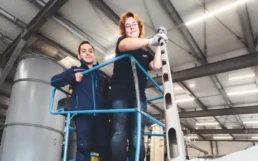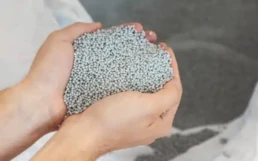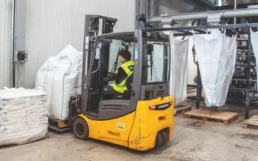PET recycling - everything is going in the best direction in Liebenau
At Interzero's new PET recycling plant, shredded returnable bottles are transformed into food-safe pellets for the beverage industry.
Replacing old with new - When it comes to recycling PET beverage bottles from a deposit system, it can be taken literally. A look at the new Interzero plant in Liebenau, Lower Saxony shows what is possible today thanks to state-of-the-art processes. However, there are no empty bottles in sight here. When the material arrives here, it has already gone through several stages of the process. The collected PET bottles were previously shredded, sorted by material and colour, and then cleaned by steaming.

1. delivery and quality control
The so-called PET flakes go to the recycling plant in big bags weighing 1,000 kilograms. The Interzero team takes a sample from every second bag, tests the material for contaminants and analyses chemical residues, moisture and viscosity. The actual processing process only begins when quality control gives the green light.
2. homogenisation
The flakes are first homogenised in mixing silos to absorb fluctuations in the material composition and thus stabilise subsequent processes. Then, using a screw conveyor, it moves to a further, even more precise sorting stage. In this case, Interzero relies on near-infrared (NIR) technology.
3 Near infrared separator
The NIR separator is fully automatic and separates any impurities and unwanted colours such as green, yellow or dark blue. Only the light blue flakes are allowed to remain in the process because they positively influence the distinct colour tones required for competing production-grade plastics.
4 Extrusion
Now the actual extrusion stage begins, which turns the pre-treated PET flakes into high-quality production pellets. For this purpose, the plastic is melted at a temperature of approximately 290 °C and fed to another screw conveyor. This viscous mass passes through several filters before finally being forced through a perforated panel to be crushed by a granulator. To make the granulate suitable for use as a food contact material, one final processing step is needed, which takes place in a solid state polycondensation (SSP) reactor. The material remains in the reactor for approximately 10 hours at a temperature of approximately 180°C, in a vacuum/nitrogen atmosphere, which allows oxygen molecules to escape and avoid unwanted reactions with the material.


5 Recycling
The finished pellets are then filled back into large bags and sent for further processing. Interzero customers use food-grade rPET to produce so-called "preforms." These "bottle blanks" are made using injection molding and look a bit like test tubes: they can be blown into full-size bottles and - once filled - go back to store shelves, completing the bottle-to-bottle cycle. This cycle starts again when consumers return their bottles for a deposit.

"This plant gives us the opportunity to sell recycled PET granules intended for food contact, which we produce ourselves. "It's 'closing the loop' here in Germany - a real sustainability benefit for our customers."
Romed Aspmair
Managing Director, RDB plastics GmbH
Facts and Figures
Bottle-to-bottle recycling in a compact form: the plant can process a total of 12,000 tonnes per year.
Recycling takes place in a vacuum, and part of the process uses a nitrogen atmosphere. This step in the process ensures that the material stream is free of moisture and unwanted substances that off-gas when the plastic is heated.
A key benefit for customers in the beverage industry: the plant is accredited by the European Food and Beverage Authority. Food Safety (EFSA).